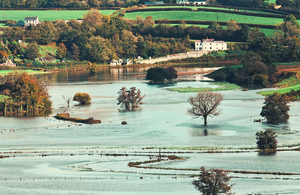The Flood Forecasting Centre – thinking globally
The Flood Forecasting Centre works with organisations across the globe to share best practice.

River flooding in Wales
As a national centre, the Flood Forecasting Centre (FFC) needs to use the latest forecasting techniques. To remain at the top of its game, it must draw on knowledge and insight that extends beyond the team based in Exeter.
This is one of the reasons why the FFC works with international partners.
Working with the Bureau of Meteorology in Australia
One such organisation is the Bureau of Meteorology in Australia. Through a Memorandum of Understanding (MoU) between them and the Environment Agency, knowledge can be shared. This can open new ways of working to improve services.
The agreement with Australia has highlighted five specific themes to work together on:
- flood forecasting systems
- flood warning and informing
- people, skills, and competency
- performance standards
- organisational performance
The partnership with Australia has already led to some useful insights that could help enhance FFC services. For example, the Bureau has been using Water Coach. This is a scenario-based exercise designed to improve forecasters’ skills. The Bureau’s Melbourne office can run an exercise remotely with forecasters in different States, so decisions are made in ‘real time’.
Australia’s Bureau has also gained insights from the FFC about the role of operational hydrometeorologist. Currently, the Bureau uses separate hydrologists and meteorologists. The FFC’s success shows how using someone trained in both hydrology and meteorology can pay dividends.
An international benchmark
International collaboration is also now being encouraged by the World Meteorological Organisation (WMO). One example is through its Assessment Guidelines for Early Warning Systems for Flood Forecasting. The WMO is introducing a scoring system to enable countries to assess their own performance on an international scale. The FFC is still working through the WMO’s benchmarking assessment guidelines. This will identify:
- FFCs strengths and weaknesses
- how other countries might learn from its experiences
The FFC also sharing its experiences through international conferences. By developing networks and sharing best practices, it is playing its part in the forecasting community.
Practical partnerships
The FFC is developing relationships with other countries as well as Australia – for example with Holland.
Another factor here is driving collaboration. Any North Sea coastal storm surge that affects England’s east coast is also likely to have an impact on Holland.
By working together, the FFC can assess how well its flood models are performing and input into Dutch modelling. In future, the need for international collaboration is only going to become more important. The FFC looks forward to developing its international networks to ensure it can continue to deliver a first-class service.